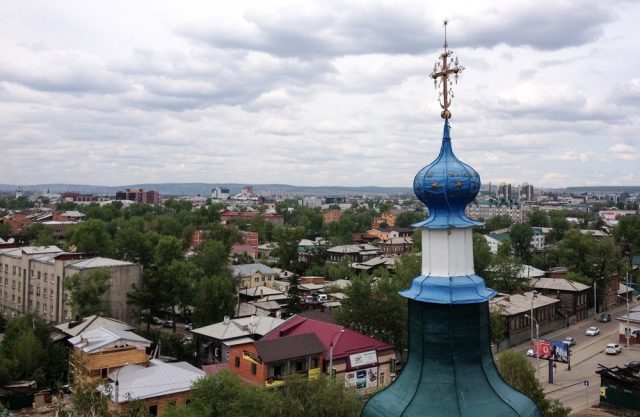
Is Putin Planning a ‘Hybrid’ Deportation of Crimean Tatars and North Caucasians?
Publication: Eurasia Daily Monitor Volume: 13 Issue: 155
By:

Reportedly, the Kremlin is mulling an idea to relocate 500,000–1,000,000 people from the southern portions of the Russian Federation to the Far East and Siberia. This prospect has sparked fears among some non-Russians. Specifically, certain regional minorities, including Crimean Tatars from the Russian-occupied Ukrainian peninsula, fear President Vladimir Putin may use this program to carry out a “hybrid” deportation of these groups in order to punish those who have resisted his power as well as to tighten his control over their regions.
Aslambek Paskachev, the head of the Putin’s Commission on Ethnic Relations, told the newspaper Izvestia, on September 21, that his group was working on a large-scale resettlement proposal, to be given to the Kremlin leader next month. This proposed plan calls for moving between 500,000 and one million Russian citizens from places where there are not enough jobs (primarily in the southern portions of the country) to those where there are not enough people (Siberia and the Far East). He said that the first candidates for moving would be “residents of certain regions of Central Russia, the Southern Federal District and the North Caucasus (Izvestia, September 21).
Such a program is needed, he continued, because Russia east of the Urals has been losing population over the last 25 years, thus creating a potential security problem. Workers from elsewhere can be stimulated to move there by subsidies of various kinds, the offer of free land, and the development of infrastructure.
This is not the first time such an idea has surfaced during Putin’s time in office. Two years ago, the Kremlin announced something similar (TASS, March 3, 2014; Kremlin.ru, December 4, 2014); but there has not been enough money or enough development in the region to make it a success. Given that there is even less money now to act as “a carrot,” experts and political leaders are suggesting this program is likely to fail, while some members of non-Russian groups in the south fear that Moscow will use various “sticks” to force them to move, in what would be a kind of “hybrid” deportation of their number from their historical homelands.
Izvestia cited the words of two experts, Anatoly Vishnevsky, of the Moscow Institute of Demography, and Igor Beloborodov, a demographer with the Russian Institute for Strategic Studies (RISI). Both suggested that the program would not work on the basis of carrots (Izvestia, September 21).
Vishnevsky said that Russia has never been able to populate Siberia and the Far East by voluntary means alone. Some may be tempted to go there by government promises, but having done so, they do not and will not remain. Indeed, he declared, Moscow lacks the resources to make such a program effective. The only way it might work is if the Russian government were to receive aid from abroad. Right now, that does not look like a promising avenue.
And Beloborodov pointed to another reason that the program would fail: taking non-Russians from the Caucasus and putting them in a predominantly ethnic-Russian milieu in Siberia and the Far East would spark ethnic conflicts and crime. He said that Moscow should focus instead on developing the economy where people already are rather than moving them somewhere else. That position is supported by parliamentarians surveyed by the Regions.ru portal (Regions.ru, September 23.
Although the money necessary to make such a program work is scarce, Putin has nevertheless repeatedly spoken about the need to build up the population of Siberia and the Russian Far East as a national security priority. As a result, at least some of those who might be candidates for this resettlement fear that Moscow may use force to accomplish its goal. This program, they worry, will thus be a covert or “hybrid” way of deporting all or part of their nations to lands east of the Urals.
One Ukrainian news agency, for example, suggested that the Kremlin had “taken a decision about the deportation of Crimeans to the Far East” and asked pointedly: “do Crimeans want ‘to die for Russia” in some future war with China (Proua.com.ua, September 21)? Interestingly, the framing of this question is an obvious reference to Moscow’s recent questioning of the willingness of Europeans to “die for Narva”—Putin’s own update of Adolf Hitler’s adopted remarks in the 1930s about the Western allies “dying for Danzig.”
Such fears of a concealed, forced mass deportation program may be overblown, but they do exist. And they highlight three problems with this latest Kremlin attempt at pursuing a “gigantist” project rather than seeking to address smaller and more immediate problems it might be able to do something about: First, this kind of talk will only further unsettle the non-Russians in the North Caucasus and in Russian-occupied Crimea, making the problem this program is supposed to solve even worse. Second, it will enrage many ethnic Russians in Siberia and the Far East who are already upset by the presence of guest workers from Central Asia and China. This anger, in turn may help to energize anti-Moscow regionalism in Russia’s eastern territories. And third, even if they do not lead to anything, such discussions will mean that ever more Russians will see just how weak their country now is, Putin’s bombast notwithstanding.




